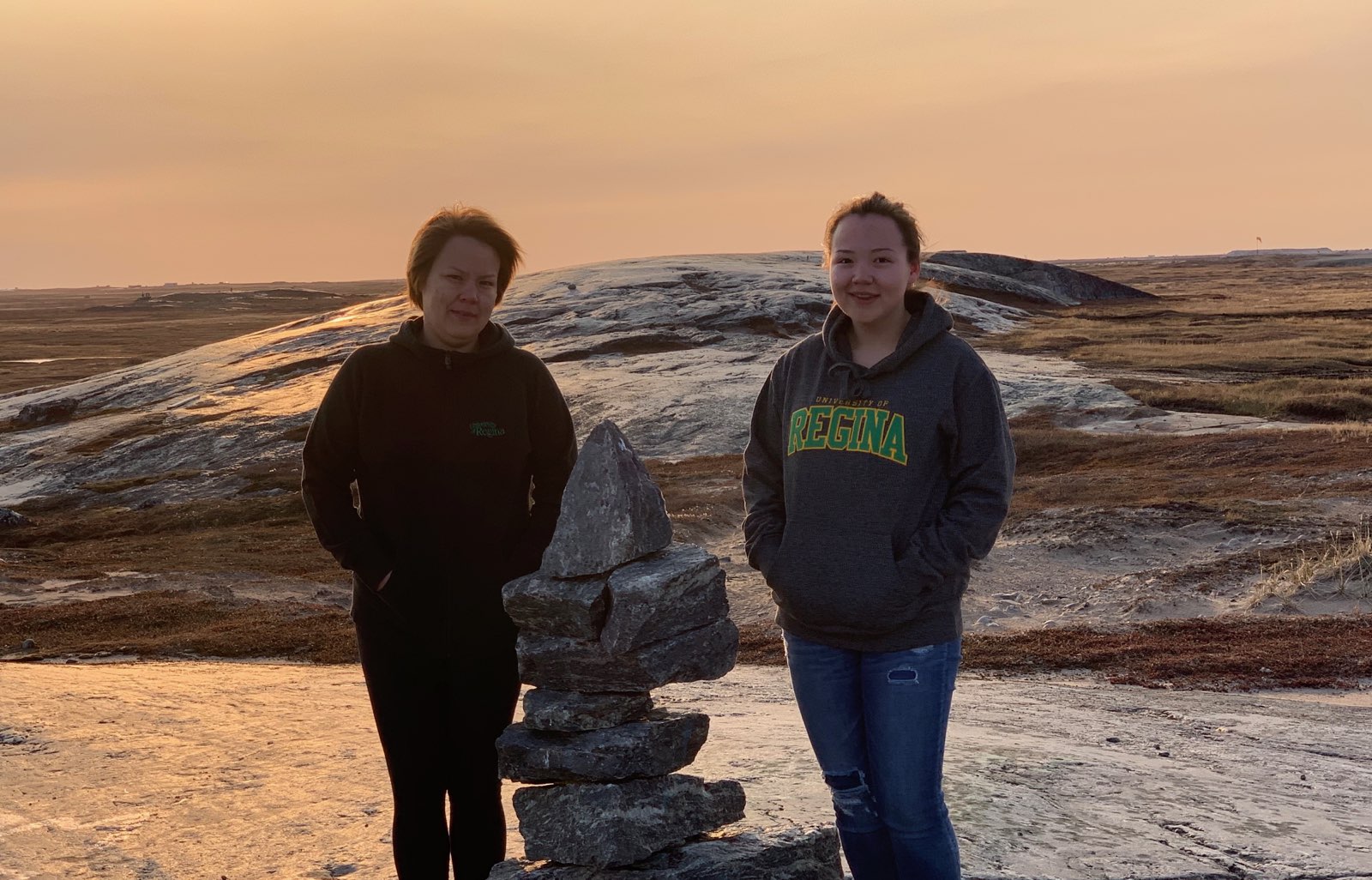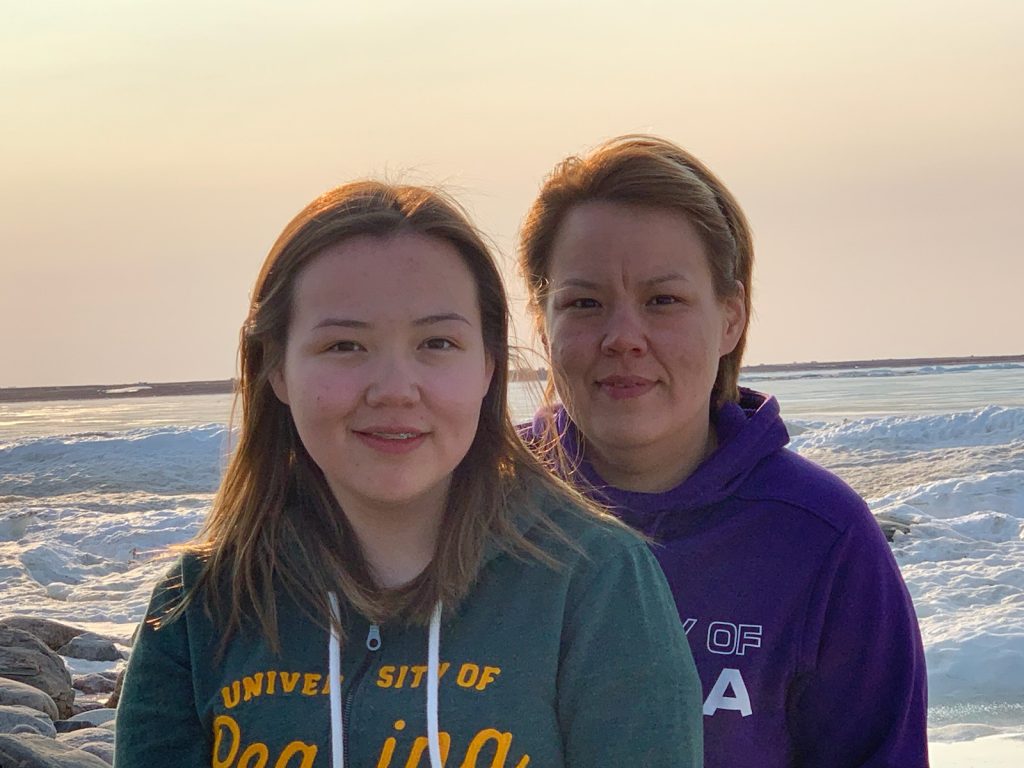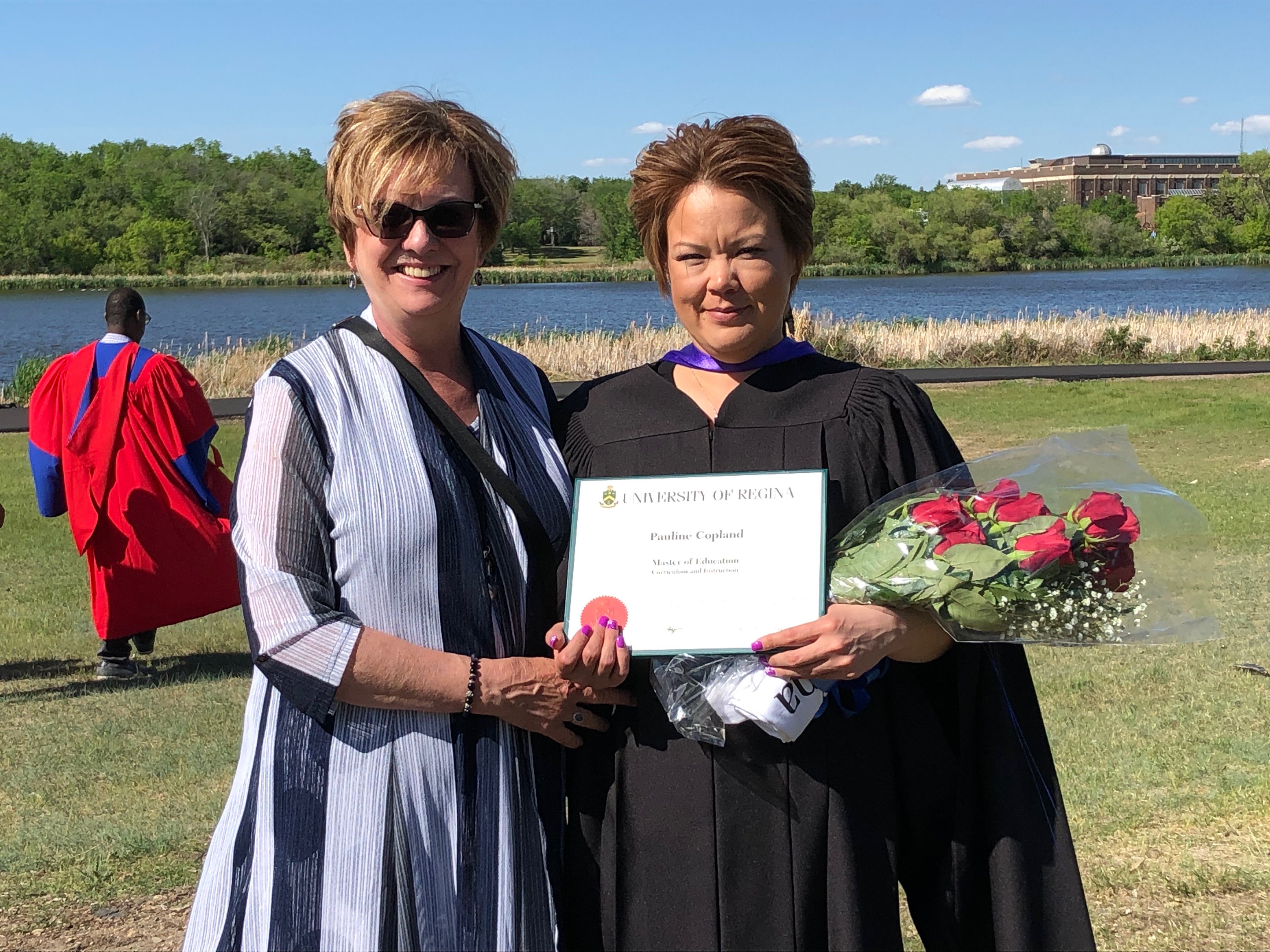 Pauline Copland has come a long way since her years of working as a clerk interpreter at a health centre in her small community of Arviat, Nunavut. A love for learning and a latent desire to become a teacher induced her to quit her job to pursue a Bachelor of Education degree at Nunavut Teacher Education Program (NTEP), which was offered in partnership with the Faculty of Education, University of Regina (U of R) for over a decade.
Pauline Copland has come a long way since her years of working as a clerk interpreter at a health centre in her small community of Arviat, Nunavut. A love for learning and a latent desire to become a teacher induced her to quit her job to pursue a Bachelor of Education degree at Nunavut Teacher Education Program (NTEP), which was offered in partnership with the Faculty of Education, University of Regina (U of R) for over a decade.
“My teachers inspired me to become a teacher. I had been a long time employee at our local health centre, but my love for children and education was always with me; so, after I had all my children, I decided to go back to school to pursue a teaching degree,” says Copland.
In 2013, Copland applied, was accepted, and began her B.Ed. program. Going back to school was challenging at first with adjustments to academics, while also parenting her five children, the youngest of which was only 15 months old when she started the program. Copland says, “I often had mom-guilt feelings because I closed the door on my kids so many times and found a quiet place to study. After the first year, things got easier and my brain got back to student mode.”
Adjustments made, Copland thrived, graduating from the NTEP/U of R Elementary Education Program with distinction in June 2017. But she wasn’t ready to stop learning: “My love for learning grew throughout the program; the more I learned about children and their development the more I was inspired to dig deeper and gain new knowledge. I had my own sense of raising children through a mother’s lens, but it was interesting to learn more about children from an educational perspective.”
Choosing a master’s program with the University of Regina made for a smooth transition: “I decided to take my Master’s at the U of R because I took U of R courses throughout the undergrad program. U of R was partnered with the Nunavut Arctic College at that time, and I kind of knew what to expect from the courses because of my experience at NTEP,” explains Copland.
With only her internship experience to qualify her for a Master’s of Education (M.Ed.) program, Copland decided to apply anyway and was accepted to the U of R program in Curriculum and Instruction: She says, “I knew I had the determination and work ethic to pull through another program after completing the NTEP program, even without the teaching experience that was required upon application. I remember telling myself, ‘I don’t have to believe everything I read, so I’m going to take a chance at this.’”
The difficulty would not prove to be academic; the decision to take the degree in Regina meant she would be leaving behind her children for extended periods of time. She says, “The hardest part of my journey was leaving my kids. It was a different story every single semester. First semester, I had two of my kids who were 5 and 12 years old and in my second semester, I had just my youngest. In my third semester, I left home without any kids to attend the spring semester.”
Each semester, leaving home was a struggle: “It was so hard to board that airplane, but I didn’t turn back and I constantly reminded myself that I am doing this for them. The first few weeks away were brutal, but as soon as I got into a routine, time went so fast. I went home in between semesters so that breather really helped me get pumped up and prepared for another semester.”
In Copland’s second year and final semester, she had the unexpected pleasure of studying alongside her daughter. Copland says, “My daughter, Michaela, decided to come to study at the U of R because she wanted to ‘take the road less traveled.’ A number of our young high school graduates go to Ottawa or Winnipeg, but she wanted to try something different. She was accepted to the Faculty of Arts, but now she is thinking about majoring in education.”
When Copland first arrived, the only person she knew was Faculty of Education Instructor Julie Machnaik, whom Copland had met through Machnaik’s work as coordinator with the NTEP partnership program for several years. Copland says, “Julie’s nice warm welcome to Regina made me feel closer to home. I live in a close-knit community, and she made the adjustment so much easier to cope with. My friend helped me in more ways than one; she took me and my kids to our new home and made sure I was settled before she left us. She was also my ‘go-to’ person as both campus and city life was new to me. I am thankful she was part of this journey.”
Living on campus gave Copland the opportunity to meet new friends who also gave her support throughout her program, and helped her deal with the hardship of being away from her children. “I met amazing people throughout the program; it was a bonus to have the support from my circle of friends,” says Copland.
Copland graduated from the master’s program in June. She says, “It was an amazing feeling to walk across the stage even for a short moment. Time went way too fast so the convocation ceremony was a great way to wrap up my thoughts around being a long time student.”
Her education has fortified her vision for education: “Every child deserves to learn in a safe and respectful environment. I think each individual should be valued in the classroom as we all learn at our own pace and time. More importantly, giving them the opportunity to learn with respect to their culture and background is something I strongly support,” says Copland.
Reflecting back on what she has accomplished, Copland says, “I close my eyes and I see and feel the campus atmosphere—I never thought, 18 years ago, that I’d get back into books and study alongside my daughter. I was a young mother so I thought I had lost all my chances of getting back into something that I liked doing and dreamed of becoming. Turns out, there is no age limit; you just have to go after your dreams and never stop believing.”
Copland has returned to Nunavut and will start her teaching career in the fall, teaching Grade 3 students. She says, “I will start in my home and comfort zone, but who knows where I’ll end up in a few years time.”
By Shuana Niessen
Follow us on social media
 Copland says, “We both felt so lucky to study alongside each other. I think it’s rare for a mom and daughter from Nunavut to attend the same university at the same time. The best part of it all was the support I was able to give her. We are from a small community and there was a big change in scenery so being there for her when she was trying to adjust to all the change was something I’d want to do with all my children. I want them to know that there is a whole world for them to explore out there—‘it’s a small world after all!’”
Copland says, “We both felt so lucky to study alongside each other. I think it’s rare for a mom and daughter from Nunavut to attend the same university at the same time. The best part of it all was the support I was able to give her. We are from a small community and there was a big change in scenery so being there for her when she was trying to adjust to all the change was something I’d want to do with all my children. I want them to know that there is a whole world for them to explore out there—‘it’s a small world after all!’”